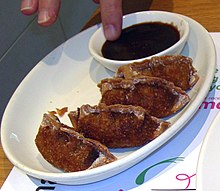Hoisin sauce
| Hoisin sauce | |||||||||||||||||||||
 Jiaozi with hoisin sauce | |||||||||||||||||||||
| Chinese name | |||||||||||||||||||||
|---|---|---|---|---|---|---|---|---|---|---|---|---|---|---|---|---|---|---|---|---|---|
| Traditional Chinese | 海鮮醬 | ||||||||||||||||||||
| Simplified Chinese | 海鲜酱 | ||||||||||||||||||||
| Literal meaning | seafood sauce | ||||||||||||||||||||
| |||||||||||||||||||||
| Vietnamese name | |||||||||||||||||||||
| Vietnamese | tương đen | ||||||||||||||||||||
| Literal meaning | black sauce | ||||||||||||||||||||
Hoisin sauce is a thick, fragrant sauce commonly used in Chinese cuisine as a glaze for meat, an addition to stir fries, or as dipping sauce. It is darkly colored in appearance and sweet and salty in taste. Although regional variants exist, hoisin sauce usually includes soy beans, fennel seeds, red chillies, and garlic. Vinegar, Chinese five spice and sugar are also commonly added.
Contents
1 History
2 Ingredients
3 Uses by regional cuisine
3.1 Chinese cuisine
3.2 Vietnamese cuisine
4 See also
5 References
6 External links
History
The word hoisin (海鮮, Cantonese: hoi2 sin1 Mandarin: hǎixiān) is Chinese for seafood, but the sauce does not contain any seafood ingredients.[1]
Ingredients
The key ingredient of hoisin sauce is fermented soy bean paste.[2]
Peking-style hoisin sauce ingredients include starches such as sweet potato, wheat and rice, and water, sugar, soybeans, sesame seeds, white distilled vinegar, salt, garlic, red chili peppers, and sometimes preservatives or coloring agents. Traditionally, hoisin sauce is made using toasted mashed soybeans. Despite the literal meaning, hoisin sauce does not contain seafood, nor is it typically used with it.
Uses by regional cuisine
Chinese cuisine
In Chinese cuisine, hoisin sauce is used in Cantonese cuisine as a marinade sauce for meat or as a dipping sauce.
Hoisin sauce can be used as a marinade sauce for meat such as barbecued pork.
Hoisin sauce can be used as a dipping sauce for Peking duck, lettuce wrap, and steamed or panfried rice noodle roll (aka cheungfan).[3]
Hoisin sauce can be used as a dipping sauce in other non-Cantonese cuisine such as Moo shu pork.[4][5]

Hoisin sauce on a Peking duck wrap

plain cheungfan with hoisin sauce, sesame seed sauce
Vietnamese cuisine
In Vietnamese, hoisin sauce is called "tương đen". It is a popular condiment for phở, a Vietnamese noodle soup, in southern Vietnam. The sauce can be directly added into a bowl of phở at the table, or it can be used as a dip for the meat of phở dishes. In phở, hoisin is typically accompanied by Sriracha sauce or "tương đỏ". The hoisin sauce is also used to make a dipping sauce for Vietnamese spring rolls and other dishes similar to spring and summer rolls. In cooking, it can be used for glazing broiled chicken.
See also
- Duck sauce
- List of dips
- List of Chinese sauces
- List of sauces
- Plum sauce
Siu haau sauce, primary Chinese BBQ sauce- Soy sauce
- Sweet and sour sauce
References
^ Ozimek, Sarah (August 29, 2018). "Hoisin Sauce". curiouscuisiniere.com. Retrieved January 28, 2019..mw-parser-output cite.citation{font-style:inherit}.mw-parser-output .citation q{quotes:"""""""'""'"}.mw-parser-output .citation .cs1-lock-free a{background:url("//upload.wikimedia.org/wikipedia/commons/thumb/6/65/Lock-green.svg/9px-Lock-green.svg.png")no-repeat;background-position:right .1em center}.mw-parser-output .citation .cs1-lock-limited a,.mw-parser-output .citation .cs1-lock-registration a{background:url("//upload.wikimedia.org/wikipedia/commons/thumb/d/d6/Lock-gray-alt-2.svg/9px-Lock-gray-alt-2.svg.png")no-repeat;background-position:right .1em center}.mw-parser-output .citation .cs1-lock-subscription a{background:url("//upload.wikimedia.org/wikipedia/commons/thumb/a/aa/Lock-red-alt-2.svg/9px-Lock-red-alt-2.svg.png")no-repeat;background-position:right .1em center}.mw-parser-output .cs1-subscription,.mw-parser-output .cs1-registration{color:#555}.mw-parser-output .cs1-subscription span,.mw-parser-output .cs1-registration span{border-bottom:1px dotted;cursor:help}.mw-parser-output .cs1-ws-icon a{background:url("//upload.wikimedia.org/wikipedia/commons/thumb/4/4c/Wikisource-logo.svg/12px-Wikisource-logo.svg.png")no-repeat;background-position:right .1em center}.mw-parser-output code.cs1-code{color:inherit;background:inherit;border:inherit;padding:inherit}.mw-parser-output .cs1-hidden-error{display:none;font-size:100%}.mw-parser-output .cs1-visible-error{font-size:100%}.mw-parser-output .cs1-maint{display:none;color:#33aa33;margin-left:0.3em}.mw-parser-output .cs1-subscription,.mw-parser-output .cs1-registration,.mw-parser-output .cs1-format{font-size:95%}.mw-parser-output .cs1-kern-left,.mw-parser-output .cs1-kern-wl-left{padding-left:0.2em}.mw-parser-output .cs1-kern-right,.mw-parser-output .cs1-kern-wl-right{padding-right:0.2em}
^ "Hoisin Sauce". lkk.com. Retrieved January 28, 2019.
^ "Crispy Cheung Fan (Rice Noodle Rolls) + Spicy Hoisin & Maple Sesame Sauce". pupswithchopsticks.com. November 13, 2017. Retrieved January 28, 2019.
^ Morocco, Chris (March 24, 2017). "This is Our Favorite Brand of Hoisin, a Superb Sauce". bonappetit.com. Retrieved January 28, 2019.
^ "Moo Shu Pork". foodnetwork.com. Retrieved January 28, 2019.
External links
- More about hoisin sauce and recipes
- What Are the Origins of Hoisin Sauce from realclearlife.com

